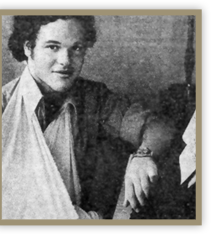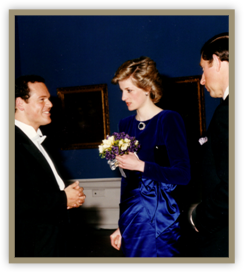
A dramatic car crash at
the age of 21 which left him with four broken bones in his right hand at
the start of his pianistic career is one of the reasons Alan Kogosowski
has developed a unique understanding of the physiological processes of
the hand.
This traumatic event
inspired Kogosowski to work as hard as he could to not only recover
full mobility of his hand, but to understand its inner workings in such a
way that he could master all the intricacies of the virtuoso piano
repertoire of Chopin, Liszt and Rachmaninoff, and not be limited in any
way in bringing out all the beauties and nuances therein.
Another reason for
Kogosowski's understanding of the physiology of the hand and arms is his
lifelong dedication to this music, from the age of six, continuing
through his teens, practising on average 8 – 10 hours every day. After
winning numerous scholarships and awards, and touring the world at age
14, when he was invited by Ed Sullivan to perform on his TV show,
Kogosowski was awarded the first Winston Churchill Memorial Fellowship
Kogosowski had a
mission: he was determined to find the answers to the problems of strain
and tightening of the muscles of the hands and wrists which inevitably
develop in young pianists in their mid-teens, as they graduate to more
strenuous repertoire, namely the big Romantic concertos by Brahms,
Liszt, Tchaikovsky and Rachmaninoff. The need to project as a soloist
over an entire orchestra, with the intricate as well as heavier style of
piano writing, with thick chords and double octaves, nearly always
brings a forcing of the body and arms, and with it a dangerous build-up
of strain. It is at this age that the pianist who is to have a life-long
career must break through the barrier from natural gift to intellectual
mastery of the technical and musical processes involved.
Kogosowski was very
aware of the need for this transition from gifted youngster to
professional in full intellectual command of his physical resources. He
travelled from academies in Philadelphia to New York, to Paris and
finally London, where he met the superb pianist Michel Block, a protégé
of Arthur Rubinstein.
Through the sensitive
guidance of Block, Kogosowski was able to clarify and refine all the
techniques for preserving the natural physical movements which had come
so easily to him as boy – movements which come automatically to all
so-called 'child prodigies', but which then dissipate unless matched by
an analytical approach.

Michel Block was trained
in the Russian school of piano playing, which scrupulously adheres to
the 'natural' way of playing, incorporating unstrained physiological
patterns and natural hand positions. This way of playing originated with
Chopin in the first half of the 19th century, and the knowledge was
transferred via Liszt and the great Russian pianist, Anton Rubinstein,
to Russia in the 1860's, through the two great academies, the St.
Petersburg and Moscow Conservatories.
Alan Kogosowski was also
trained in the Russian school from an early age, by his adored mentor,
the distinguished Leo Shalit, who came to Australia from Riga after the
war, and who had studied in Moscow during the 1920s. Leo Shalit had
inculcated in the young Kogosowski the loose hanging arm described in
Kogosowski's books, the natural position of the hand and its
'dead-weight' drop when allowed to fall in this way.
When he found Michel
Block, Kogosowski was able to acquire an intellectual grasp of the
natural movements he had been brought up to follow, and from there to
develop a scientific approach to the application of the physiological
processes of the hand and finger movements in relation to the sounds
required.
Alan Kogosowski is one
of the few pianists in the world to have truly earned the special title
'Chopinist', in recognition of his dedication to, and understanding of,
the music of the piano's greatest composer. The Chicago Sun Times
declared that this was 'Chopin in the hands of a master'. Kogosowski has
produced a TV series about the life and music of Frederic Chopin, in
which he introduces and performs a wide range of the composer's key
works. When first broadcast on television in
America, the New York Times classed it as 'outstanding.' This
series is now available on DVD, from www.kogosowski.com.
A favourite of the
British royal family, Kogosowski's performances of Beethoven sonatas for
Princess Diana and Prince Charles at the Royal Academy of Arts was
recorded by Polygram, as was his concert for the Queen Mother in St.
James' Palace.
Kogosowski is also
recognized as an outstanding presenter of music. For ten years he hosted
Schubertiades at Sotheby's in London.
Kogosowski has
contributed two outstanding additions to the concert reperoire. Concerto
Elégiaque, his orchestration of Rachmaninoff's Trio in D minor, was
recorded by the Detroit Symphony Orchestra with Kogosowski as soloist.
The CD was named Best Recording of the Year by the American Record
Guide, and is a best-seller. This striking work was followed by his
reconstruction and orchestration of Chopin's unfinished Concerto No. 3
in A major.
After his years of study
of the anatomical aspects of piano technique, he has successfully
adapted his knowledge of the correct positioning of the hands and
fingers and posture at the keyboard to the prevention and remedy of this
condition – which has afflicted pianists and violinists for years, but
which has now come to much wider general attention.




